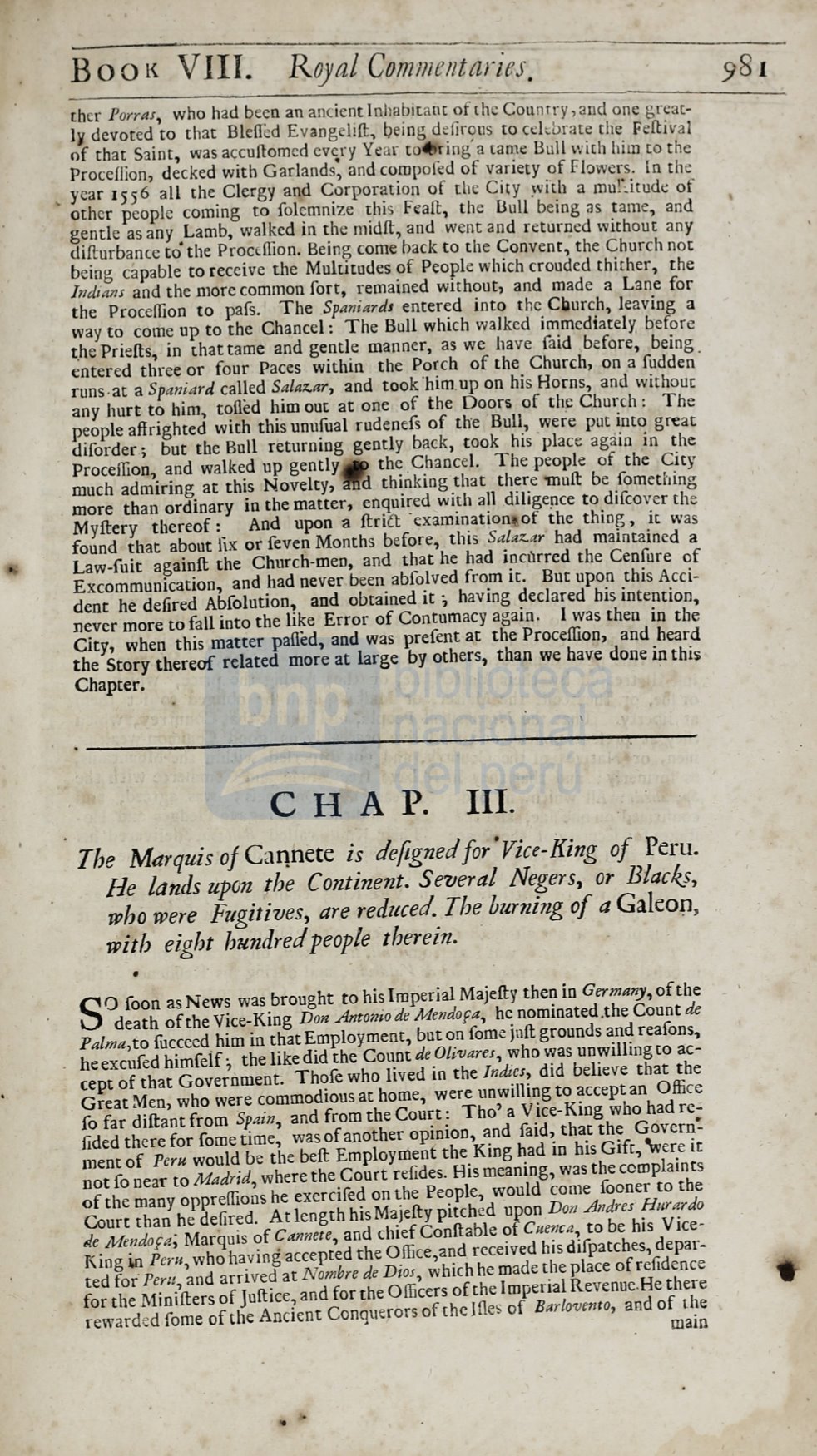

BooK
VHI.
Royal
Commentaries.
rher
Porra1,
who had been an ancient Inha~itant of lhc Counrry, and one greac–
lj
devoted to that Ble!fed Evangel!ft, be1ng defirons to ceh:brate che Fefüval
of that Sain t, was ac_cuftomed evvy Year ro~ring' a carne Bull with him to the
Proceffion, decked w1th Garlands, and compofed of variety of Flowers. In che
year 1556 ali the_Clergy and C_orpor~tion of the City :wi"th a muLicudt: of
other people commg to fol
7
mnize ~h1s Feafr, the Bull being as tame, and
gentle as any Lamb, walked m the m1dfr, and went and returned without any
difrurbance co· the Procdiion. Being come back to the Convent the Church not
being cápable to receive the Multitudes of People which crouded thither
the
l ndian1
and the more cornmon
fort,
remained without, and made a Lan~ for
the Proceffion to pafs. The
SpaniardJ
entered into the Cburch, leaving a
way t~ com~ up to the Chancel: The Bull which walked i~mediately: befare
t_he Pnefts, m that tarne and gentle manner, as we have fa1d .befare being
entered three or four P
aces within the Porch of the Church, on a' fodden ·
runs -at a
Spaniard
called
Salaz.ar,and took '
him.upon his Horns, and withouc
any hurt to him, tofied him out at one of the Doors of th.e Church : The
p~ople aflrighted with this unu(ual rudenefs of the Bull_, _were put inca great
d1forder; but the Bull returnmg gently back, took h1s place again in the
Proceffion, and walked up gently
the .Chancel. The people of the
City
much admiring at this Novelty,
d thinking that there muft be fomethin"
more than ordinary in the matter, enquired with all dilige!]ce to difcover th~
Myftery thereof:
And upon a ftriét ·examinat
ion of the thing, it was
found that about l}x or feven Months before, this
Salaz.ar·had maintained a
Law-fuit agaioft the Church-men, and that he had incürred the Cenfure of
Excommunication, and had never been abfolved from it. But upon this Acci–
dent he ddired Abfolution, and obtained it ; having declared his intention
never more to fall into the like Error of Contumacy again.
I was then in th;
City, when this matter pafied, and was prefent at the Proceffion, and heard
the Story thereof related more at large by others, than we have done in this
Q~~
.
CH A P.
III.
The Marquis of
Caqnete
is defigned far
0
Vice-King of
Peru.
El.e lctnds upan ¡he Continent. Severa/ Negers, or Black.},
who were Fugitives, are reduced. The burning of a
Galeo.p,
with eight hundredpeop!e therein.
·
S
O foon as News was brought to his Imperial Majefty then in
Germany,
ofthe
death ofthe Vice-King
Don Antonio de M endofa,
he nominated.the Count
de
Palma,to
fucceed him in that Employ.ment, but on fome juft grounds and reafons,
heexcufed himfeif; the likedid the Count
de Olivaru,
who was unwilling
to
ac–
cepc
of that Government; Thofe who lived in the
Jndics,
did believe that the
Great Men, who were commodious ac home, were unwilling to accept an Office
fo
far diftant from
Spain,
and from the Courc: Tho' a Vice-King who had re–
fided there for fome time, was ofanother opinion, and faid, that the Govern
~
mene of
Peru
would be the beft Employment the King had in his Gifc, \vere it
not
fo
near to
Madrid,
where the Court refides. His meaning, was the complaints
of che many oppreffions he exercifed on the People, would come fooner to tbe
Court thao he defired. At length bis Majefty pitched upon
Don Andm Hwardo
de M endofa;
Marquis of
Cannete,
and chief Confiable ?f
C11e~ca
1
to be bis Vice–
King
~
Peru,
who ha_ving accepted the O_ffice,a~d rece1ved bis d1fpatcbes, depar–
ted for'
Pem,
and arnved at
Nombre de Dios,
wh1ch he made t_he
place ofFefidence
for the Minifters of Juftice, and for the Oflicers of the Imperial Revenue.He there
rewarded fome of che Ancient Conque_rors of che lfles of
Barlovento,
and of t~e
mam














